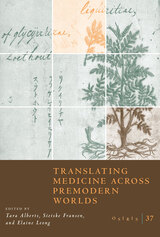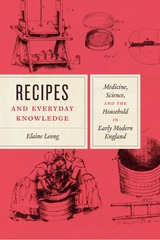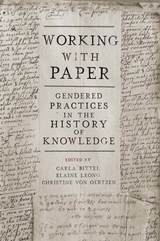3 books about Leong, Elaine

Osiris, Volume 37
Translating Medicine across Premodern Worlds
Edited by Tara Alberts, Sietske Fransen, and Elaine Leong
University of Chicago Press Journals, 2022
Highlights the importance of translation for the global exchange of medical theories, practices, and materials in the premodern period.
This volume of Osiris turns the analytical lens of translation onto medical knowledge and practices across the premodern world. Understandings of the human body, and of diseases and their cures, were influenced by a range of religious, cultural, environmental, and intellectual factors. As a result, complex systems of translation emerged as people crossed linguistic and territorial boundaries to share not only theories and concepts, but also materials, such as drugs, amulets, and surgical tools. The studies here reveal how instances of translation helped to shape and, in some cases, reimagine these ideas and objects to fit within local frameworks of medical belief.
Translating Medicine across Premodern Worlds features case studies located in geographically and temporally diverse contexts, including ninth-century Baghdad, sixteenth-century Seville, seventeenth-century Cartagena, and nineteenth-century Bengal. Throughout, the contributors explore common themes and divergent experiences associated with a variety of historical endeavors to “translate” knowledge about health and the body across languages, practices, and media. By deconstructing traditional narratives and de-emphasizing well-worn dichotomies, this volume ultimately offers a fresh and innovative approach to histories of knowledge.
This volume of Osiris turns the analytical lens of translation onto medical knowledge and practices across the premodern world. Understandings of the human body, and of diseases and their cures, were influenced by a range of religious, cultural, environmental, and intellectual factors. As a result, complex systems of translation emerged as people crossed linguistic and territorial boundaries to share not only theories and concepts, but also materials, such as drugs, amulets, and surgical tools. The studies here reveal how instances of translation helped to shape and, in some cases, reimagine these ideas and objects to fit within local frameworks of medical belief.
Translating Medicine across Premodern Worlds features case studies located in geographically and temporally diverse contexts, including ninth-century Baghdad, sixteenth-century Seville, seventeenth-century Cartagena, and nineteenth-century Bengal. Throughout, the contributors explore common themes and divergent experiences associated with a variety of historical endeavors to “translate” knowledge about health and the body across languages, practices, and media. By deconstructing traditional narratives and de-emphasizing well-worn dichotomies, this volume ultimately offers a fresh and innovative approach to histories of knowledge.
[more]

Recipes and Everyday Knowledge
Medicine, Science, and the Household in Early Modern England
Elaine Leong
University of Chicago Press, 2018
Across early modern Europe, men and women from all ranks gathered medical, culinary, and food preservation recipes from family and friends, experts and practitioners, and a wide array of printed materials. Recipes were tested, assessed, and modified by teams of householders, including masters and servants, husbands and wives, mothers and daughters, and fathers and sons. This much-sought know-how was written into notebooks of various shapes and sizes forming “treasuries for health,” each personalized to suit the whims and needs of individual communities.
In Recipes and Everyday Knowledge, Elaine Leong situates recipe knowledge and practices among larger questions of gender and cultural history, the history of the printed word, and the history of science, medicine, and technology. The production of recipes and recipe books, she argues, were at the heart of quotidian investigations of the natural world or “household science”. She shows how English homes acted as vibrant spaces for knowledge making and transmission, and explores how recipe trials allowed householders to gain deeper understandings of sickness and health, of the human body, and of natural and human-built processes. By recovering this story, Leong extends the parameters of natural inquiry and productively widens the cast of historical characters participating in and contributing to early modern science.
In Recipes and Everyday Knowledge, Elaine Leong situates recipe knowledge and practices among larger questions of gender and cultural history, the history of the printed word, and the history of science, medicine, and technology. The production of recipes and recipe books, she argues, were at the heart of quotidian investigations of the natural world or “household science”. She shows how English homes acted as vibrant spaces for knowledge making and transmission, and explores how recipe trials allowed householders to gain deeper understandings of sickness and health, of the human body, and of natural and human-built processes. By recovering this story, Leong extends the parameters of natural inquiry and productively widens the cast of historical characters participating in and contributing to early modern science.
[more]

Working with Paper
Gendered Practices in the History of Knowledge
Carla Bittel, Elaine Leong, Christine von Oertzen
University of Pittsburgh Press, 2019
Working with Paper builds on a growing interest in the materials of science by exploring the gendered uses and meanings of paper tools and technologies, considering how notions of gender impacted paper practices and in turn how paper may have structured knowledge about gender. Through a series of dynamic investigations covering Europe and North America and spanning the early modern period to the twentieth century, this volume breaks new ground by examining material histories of paper and the gendered worlds that made them. Contributors explore diverse uses of paper—from healing to phrenological analysis to model making to data processing—which often occurred in highly gendered, yet seemingly divergent spaces, such as laboratories and kitchens, court rooms and boutiques, ladies’ chambers and artisanal workshops, foundling houses and colonial hospitals, and college gymnasiums and state office buildings. Together, they reveal how notions of masculinity and femininity became embedded in and expressed through the materials of daily life. Working with Paper uncovers the intricate negotiations of power and difference underlying epistemic practices, forging a material history of knowledge in which quotidian and scholarly practices are intimately linked.
[more]
READERS
Browse our collection.
PUBLISHERS
See BiblioVault's publisher services.
STUDENT SERVICES
Files for college accessibility offices.
UChicago Accessibility Resources
home | accessibility | search | about | contact us
BiblioVault ® 2001 - 2024
The University of Chicago Press









